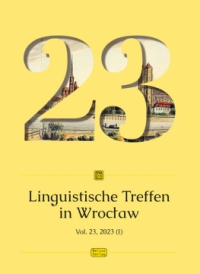Realienbezeichnungen in deutschen Reisekatalogen aus translatorischer Sicht
Culture-Specific Expressions in German Travel Catalogues from a Translational Perspective
Author(s): Karolina OstrowskaSubject(s): Language and Literature Studies, Theoretical Linguistics, Applied Linguistics
Published by: Oficyna Wydawnicza ATUT – Wrocławskie Wydawnictwo Oświatowe
Keywords: culture-specific expressions; translation; travel catalogue; cultural context
Summary/Abstract: The aim of this paper is to analyse culture-bound units that appear in German travel catalogues. The following German travel catalogues constitute the research material: “Chamäleon” and “Gebeco”. Selected examples of the culture-specific expressions from the above-mentioned catalogues are subjected to the analysis, assigned to the corresponding type and subsequently discussed. The paper focuses also on the methods of rendering techniques of the selected culture-bound units, which encounter translations problems while being translated into Polish. The paper’s conclusions point out the importance of cultural background understanding for both the source and the target language, in order to accurately render the culture-specific items. Country- and culture-specific foreign terms appearing in the travel offers refer to the places all over the world and are available in great numbers for people interested in excursions. It can thus be noticed that different countries and cultures constantly bring with them new culture-specific words or expressions. Hence, a certain world knowledge is required while reading holiday offers. Even though readers interested in travels do not need to know the exact meanings of the culture-specific expressions, they should have a general idea of country-specific foreign terms. Besides, at least a basic knowledge of the English language is indispensable, because the travel catalogues contain a plethora of Anglicisms. Tourist offers also contain short slogans in English, which are usually translated neither into German nor into the other language. Some words that are commonly used, such as pizza or safari, do not require translation or additional explication. However, there are some expressions that are not comprehensible for most of the readers because of the fact that they are less common or conceal very specific, complex meanings. Therefore, this paper aims to present the best potential translation solutions for such culture-specific expressions into Polish.
Journal: Linguistische Treffen in Wrocław
- Issue Year: 23/2023
- Issue No: 1
- Page Range: 291-303
- Page Count: 13
- Language: German

